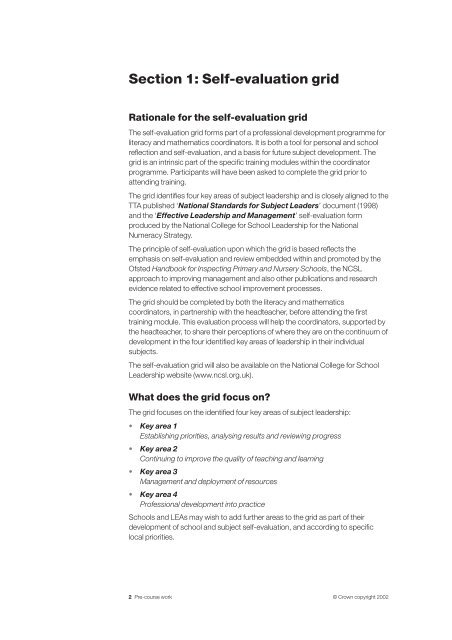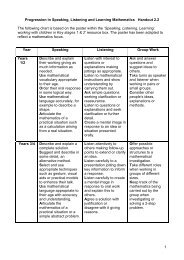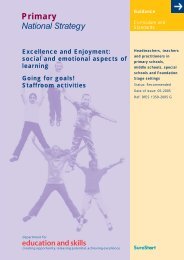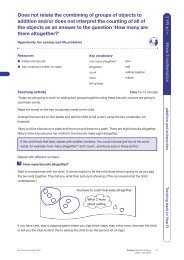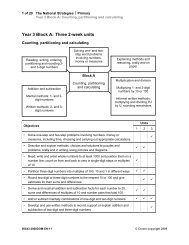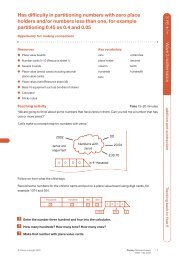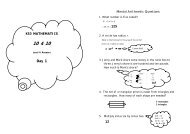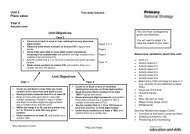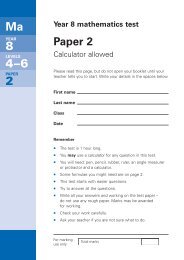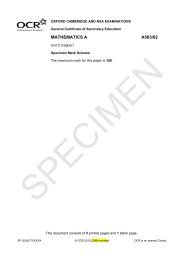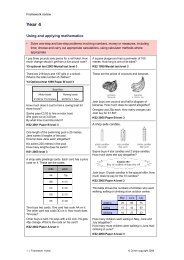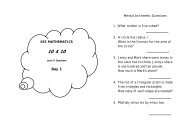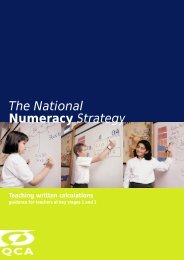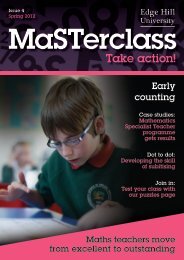Section 1: Self-evaluation grid
Section 1: Self-evaluation grid
Section 1: Self-evaluation grid
Create successful ePaper yourself
Turn your PDF publications into a flip-book with our unique Google optimized e-Paper software.
<strong>Section</strong> 1: <strong>Self</strong>-<strong>evaluation</strong> <strong>grid</strong>Rationale for the self-<strong>evaluation</strong> <strong>grid</strong>The self-<strong>evaluation</strong> <strong>grid</strong> forms part of a professional development programme forliteracy and mathematics coordinators. It is both a tool for personal and schoolreflection and self-<strong>evaluation</strong>, and a basis for future subject development. The<strong>grid</strong> is an intrinsic part of the specific training modules within the coordinatorprogramme. Participants will have been asked to complete the <strong>grid</strong> prior toattending training.The <strong>grid</strong> identifies four key areas of subject leadership and is closely aligned to theTTA published ‘National Standards for Subject Leaders’ document (1998)and the ‘Effective Leadership and Management’ self-<strong>evaluation</strong> formproduced by the National College for School Leadership for the NationalNumeracy Strategy.The principle of self-<strong>evaluation</strong> upon which the <strong>grid</strong> is based reflects theemphasis on self-<strong>evaluation</strong> and review embedded within and promoted by theOfsted Handbook for Inspecting Primary and Nursery Schools, the NCSLapproach to improving management and also other publications and researchevidence related to effective school improvement processes.The <strong>grid</strong> should be completed by both the literacy and mathematicscoordinators, in partnership with the headteacher, before attending the firsttraining module. This <strong>evaluation</strong> process will help the coordinators, supported bythe headteacher, to share their perceptions of where they are on the continuum ofdevelopment in the four identified key areas of leadership in their individualsubjects.The self-<strong>evaluation</strong> <strong>grid</strong> will also be available on the National College for SchoolLeadership website (www.ncsl.org.uk).What does the <strong>grid</strong> focus on?The <strong>grid</strong> focuses on the identified four key areas of subject leadership:• Key area 1Establishing priorities, analysing results and reviewing progress• Key area 2Continuing to improve the quality of teaching and learning• Key area 3Management and deployment of resources• Key area 4Professional development into practiceSchools and LEAs may wish to add further areas to the <strong>grid</strong> as part of theirdevelopment of school and subject self-<strong>evaluation</strong>, and according to specificlocal priorities.2 Pre-course work © Crown copyright 2002
How does the <strong>grid</strong> work?Under each of the key areas, there are four columns which represent a continuumof development and effectiveness. Within each column there are written promptswhich serve to provide a moderated illustration of the elements which will bepresent at each stage of development. By highlighting the relevant prompts, orparts of the prompts, across the <strong>grid</strong>, coordinators can identify their school’scurrent strengths and areas for development.The table below illustrates the stages of the continuum represented on the <strong>grid</strong>.Focusing Developing Establishing EnhancingKey area identifiedAt this stage, thecoordinatorrecognises that theschool is at thebeginning of aprocess. Thecoordinator identifieswhat is happeningalready butrecognises that muchremains to be done.At the developingstage, the school hasstarted to addresssome aspects of thekey area, but there isa need for furtherdevelopment tosecure andconsolidate practiceand process inidentified aspects.At this stage, therestill remain someissues to address interms of wholeschoolconsistencyand cohesion butmany things are nowin place and arebecomingembedded. Therehas been significantdevelopment of thequality of provisionand a real impact onstandards.At this stage, theidentified aspects ofthe subject areembedded fully inwhole-schoolapproaches andpractice. There iswhole-schoolconsistency andcohesive practiceand the impact onstandards andprogress is evident.These prompts provide moderation to support self-<strong>evaluation</strong>.It is important to recognise that whole-school development is not always astraightforward linear process – schools are changing communities andjudgements about positions on the developmental continuum may change as aconsequence of changing contexts. It is also important to stress that the purposeof this activity is to acknowledge not only what has been achieved but importantlyalso to provide a basis for future development, whatever prompts are highlightedat this stage. Planning for development from the current position is the key issue.It is also important to acknowledge the different school contexts in whichcoordinators work. For example, some coordinators have regular release time tocarry out their responsibilities; others have very limited time in which to carry outtheir coordinating role. In some schools there is a very close relationship betweenthe senior management team and literacy/mathematics coordinators; in otherschools, coordinators are more isolated and have less opportunity to impact onpolicy and whole-school development.3 Pre-course work © Crown copyright 2002
How do I use the <strong>grid</strong>?A version of the self-<strong>evaluation</strong> <strong>grid</strong> is available to download on the CD-ROM thataccompanies this handbook.• Use the <strong>grid</strong> to support reflection on your school’s current stages ofdevelopment in each of the four key areas.• Work with your coordinator colleague, and headteacher wherever possible, toshare perceptions and analyse patterns of development across both literacyand mathematics in these key areas.• Highlight those prompts, or parts of the prompts, which best reflect yourperception of where your school is now in each of the four key areas.• Discuss any obvious issues arising from this initial self-<strong>evaluation</strong> in terms ofpatterns of strength and areas for development in the two subjects in the lightof your whole-school context.• Bring the <strong>grid</strong> to the coordinator training to support you in reflection andaction planning in order to consolidate your practice or move forward alongthe continuum of development.• Following the coordinator training, coordinators and headteachers will find ithelpful to reflect on appropriate priorities and key action points to securefurther subject development within the context of whole-school improvement.• From the self-<strong>evaluation</strong> process, it will be possible to see clearly the relativestrengths and areas for development in the leadership and management ofthe two core subjects of English and mathematics and to decide on prioritiesfor action in the context of whole-school as well as subject needs.• It is expected that the self-<strong>evaluation</strong> <strong>grid</strong> should take no more than an hour tocomplete and discuss.Generic prompts to support completion of theself-<strong>evaluation</strong> <strong>grid</strong>• As an immediate, instinctive response, where do I place the school on this<strong>grid</strong>? Are we focusing, developing, establishing or enhancing?• Which parts of the written prompts can I highlight with confidence?• How do I know? What is my evidence base for highlighting the prompts?• Are there areas I would prefer to underline at this stage and re-visit afterfurther reflection and discussion?• How far would other staff agree with my perceptions and <strong>evaluation</strong>s?4 Pre-course work © Crown copyright 2002
Raising standards in literacy and mathematics<strong>Self</strong>-<strong>evaluation</strong> to establish prioritiesThe purpose of the self-<strong>evaluation</strong> <strong>grid</strong> is to support coordinators in recognising the current stage of development and identifying keypriorities for development across the school.• Key area 1: Establishing priorities, analysing results and reviewing progress• Key area 2: Continuing to improve the quality of teaching and learning• Key area 3: Management and deployment of resources• Key area 4: Professional development into practiceKey area 1: Establishing priorities, analysing results and reviewing progressFocusing Developing Establishing Enhancing1a Establishing priorites,action planning andreviewAn audit of literacy/mathematicsprovision, professionaldevelopment needs andquantitative outcomes, in termsof standards and progress, hasbeen carried out. As a result, keypriorities for action have beenidentified.Using the audit, an agreed actionplan that addresses identifiedpriorities and appropriateresources has been developedand is being implemented.The impact of the action plan ismonitored and evaluated.The plan is refined following theoutcome of <strong>evaluation</strong>.The school’s priorities forimproving literacy/mathematicsare part of the whole-schoolimprovement programme withclearly identified subject-specificpriorities and systematic reviewand <strong>evaluation</strong>.1b Knowing about standards Teachers assess children’s workregularly and national/other testsare in place. There is access torelevant data on standards, e.g.baseline assessment, data onstatutory and optional tests,ongoing teacher assessmentsand work samples. There islimited confidence in the use ofthis data.There is a systematic structurefor assessing children’s work andprogress. Data is starting to beused to inform judgements onstandards across the school,noting patterns in children’sachievement.There is work across the schoolto moderate teacherassessments and to analyse datato inform teachers’ planning, settargets and monitor progress in acomprehensive and systematicmanner.School assessment systems arerigorous and effective. There isclose co-operation between theheadteacher, staff and governersin using data to raise standards inliteracy/mathematics.1c Target setting There is as yet no systematicwhole-school approach to thesetting of numerical andcurricular targets to trackchildren’s progress and raisestandards in literacy/mathematics.Teachers are supported in settingrealistically challenging numericaltargets for each year group. Theyare supported in trackingchildren’s progress by settingcurricular targets based on aclear identification of learningneeds.There is an effective process forsetting and reviewing numericaland curricular targets in eachyear group. All teachers are ableto use targets to track children’sprogress, inform their teachingand raise standards.There is an effective, coherentand manageable whole-schoolsystem for setting and revisingtargets against children’sprogress.5 Pre-course work © Crown copyright 2002
1d Monitoring and evaluatingthe development ofliteracy/mathematicsA start has been made inmonitoring and evaluating arange of aspects of subjectresponsibility.There is a clear structure formonitoring and evaluatingliteracy/mathematics in order toidentify key priorities forimproving standards of teachingand learning.The outcomes of the monitoringand <strong>evaluation</strong> of aspects ofliteracy/mathematics are used toinform future schoolimprovement planning.Monitoring and evaluating isembedded within the schoolimprovement plan and is effectivein celebrating success andidentifying areas for furtherimprovement.Key area 2: Continuing to improve the quality of teaching and learningFocusing Developing Establishing Enhancing2a Evaluating thequality of the teaching ofliteracy/mathematics andgiving appropriatefeedbackClassroom observations and/orscrutiny of children’s work hasraised awareness of:• the quality of teaching ofliteracy/mathematics acrossthe school;• the strengths and weaknessesof teachers’ subjectknowledge.There is a developingprogramme to monitor thequality of teaching ofliteracy/mathematics.Weaknesses in teaching arerecognised and staff are givenfeedback. Actions to be takenare identified and incorporatedinto the literacy/mathematicsaction plan or schoolimprovement plan.Systems are in place formonitoring and evaluating thequality of teaching. This isimpacting positively onclassroom practice. Some areasof weakness in teaching remainbut are being addressed throughfeedback and professionaldevelopment.There is systematic andstructured <strong>evaluation</strong> of literacy/mathematics teaching across theschool. The literacy hour anddaily mathermatics lesson aretaught well. Weaknesses insubject knowledge, and teachingand learning are being addressedeffectively. There is appropriatefeedback, support and relatedtraining for all staff.2b Support for planning;monitoring the process;evaluating outcomesTeachers’ weekly plans aresampled.Teachers are supported in theirplanning and given feedback tohelp them to moderate andamend as appropriate.Medium- and short-term plansare reviewed and teachers aresupported in ensuring plansmatch the expected levels ofachievement of children.Colleagues are supported inproducing plans which arecoherent, succinct and effectivein addressing learning needs.Plans are evaluated in the light oflearning outcomes.6 Pre-course work © Crown copyright 2002
2c Using ICT to supportliteracy/mathematicsStaff are aware of the need toincorporate ICT as anappropriate resource to supportthe teaching ofliteracy/mathematics.Staff are aware of NLS/NNStraining materials and a range ofother ICT resources to supportthe teaching of literacy/mathematics.With the ICT coordinator, theprofessional development needsof teachers in the use of ICT tosupport teaching have beenidentified.There is close collaboration withthe ICT coordinator to supportteachers in planning for theappropriate use of ICT in theteaching of literacy/mathematicsand in monitoring and evaluatingthe use of ICT in a range ofliteracy/mathematics teaching.ICT is being effectively integratedinto teachers’ planning forliteracy/mathematics. Joint<strong>evaluation</strong>s show that ICT isbeing used effectively inliteracy/mathematics teaching.Key area 3: Management and deployment of resourcesFocusing Developing Establishing Enhancing3a Establishing an effectivelearning environmentThe importance of an effectiveenvironment to support theteaching and learning of literacy/mathematics in all classrooms isrecognised.Through classroom observationsand an audit of resources, keyareas for action have beenidentified in order to promote aneffective environment which willsupport children’s learning ofliteracy/mathematics.A systematic plan is in place tosupport improvement of theenvironment in which childrenlearn literacy/mathematics.The school environment makes akey contribution toliteracy/mathematics learning forall children.3b Deployment of additionaladultsThe expertise and skills ofadditional adults are matched toidentified needs for support inliteracy and mathematics acrossthe school.Support systems are developingbetween additional adults andteachers for planning supportand reviewing the progress ofindividuals/groups of children.The impact of support byteachers and additional adults isevaluated against bothquantitative and qualitativelearning outcomes.Monitoring of the impact ofadditional adult support showsthat a difference is made tochildren’s attainment andprogress. There is a clearunderstanding between theteacher and additional adult ofthe learning needs of children.7 Pre-course work © Crown copyright 2002
Key area 4: Professional development into practiceFocusing Developing Establishing Enhancing4a Identifying CPD(Continuing professionaldevelopment) needsInformation about training isselected and staff areencouraged to attend relevantcourses.Staff are helped to be moreselective about the type ofprofessional development inwhich they participate and relatethis closely to the literacy/mathematics action plan.A CPD policy which relates toindividual and school needs withclear links to the development ofliteracy/mathematics is in place.Most staff are committed to thepolicy and understand how it willimpact on their own professionaldevelopment.The planned CPD programmesupports school, LEA andnational priorities and meets theneeds of all staff. The impact ofthe CPD programme ismonitored and evaluatedsystematically.4b Supporting colleagues Resources to support colleaguesin improving the teaching ofliteracy/ mathematics aremanaged and organised.Individuals are supported onrequest to help them to improvethe quality of the teaching ofliteracy/mathematics.A planned programme of supportis being developed in order toaddress whole-school andindividual needs. This supportprogramme includes traineeteachers and other additionaladults.There is a coherent supportprogramme in place and all staffare involved in a review and<strong>evaluation</strong> of the professionaldevelopment and support theyhave received. When appropriatethe impact of professionaldevelopment is evaluatedthrough visits to classrooms andinformal feedback.A planned programme of supporthas been devised, responding towhole-school and individualneeds.All staff are supported indeveloping high quality teachingand learning inliteracy/mathematics.Evaluation of the support showspositive impact on teaching andlearning.8 Pre-course work © Crown copyright 2002


